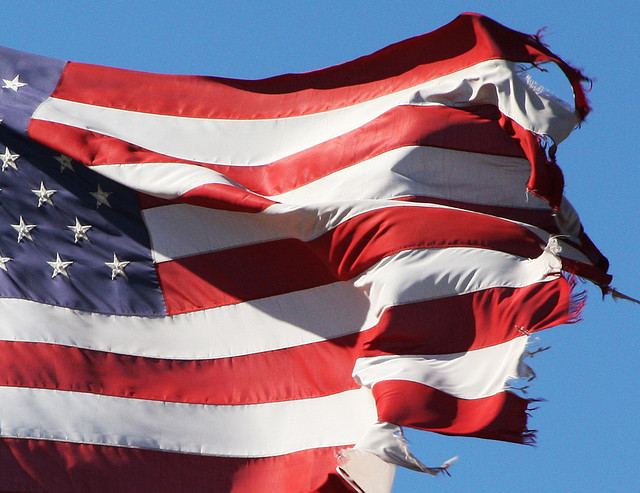I (Don't) Pledge Allegiance
photo by Beverly & Pack, via Flickr

I pledge allegiance to the flag
of the United States of America, and to the republic for which it stands,
one nation under God, indivisible, with liberty and justice for all.
Nope.
I have been thinking about this for the past year (maybe longer), and have decided that I can no longer recite the Pledge of Allegiance in good conscience. I can’t pledge my loyalty a flag, or the nation it represents, because I am not loyal to the United States of America. I’ll give some historical, contextual reasons, and some theological reasons.
NOTE: Please do not read this as a defense for my position. This is simply my reflection.
Historical
The USA is not one nation under God, despite what some believe. “One nation under God” was not added to the pledge until 1954, and if you do a quick Google search, you can check out the history behind it. The USA has never been a Christian nation. The right to bear arms, the right to free speech, and the right to individual liberty, are not inherently Christian principles. The founding fathers were not all Christians.
I think about the context surrounding the Declaration of Independence and ask myself, who wrote and signed it? Who did they have in mind when they signed onto this?
We hold these truths to be self-evident, that all men are created equal, that they are endowed by their Creator with certain unalienable Rights, that among these are Life, Liberty and the pursuit of Happiness.
Why was the revolution instigated? How?
Let me say first and foremost that I am not a historian by any means, so if you want a nice, succinct summary of some of the problems surrounding the first Independence Day, read Carson’s annual blog post.
Second, I’ve been slowly making my way through Howard Zinn’s A People’s History of the United States. If I’ve been understanding his interpretation correctly, he asserts that the Revolutionary War was instigated, at least in part, because some of the upper class did not want to answer to the British government for their unjust treatment of poor tenants, who were working the rich guys’ land. The instigators were then able to stir up discontent amongst lower classes in order to gain bodies for the cause. If this is in fact true, then the origins of Revolutionary War and the following Declaration of Independence remain dubious to me. I am extremely hesitant to say that the Revolutionary War was justified.
When I think about who wrote the Declaration of Independence, and who signed onto it, it’s clear they did not have liberty and justice in mind for everyone. These were upper and middle class men. The upper class, who owned land and property, could still treat the poor however they wanted; women were not seen as equals (they were more seen as, dare I say, property), the first settlers used and slaughtered the indigenous people because they were “savages”, and...not to mention the slave trade. Liberty and justice for all? Liberty and justice for middle to upper class white men, yes. But, everyone? I think not.
(For more on the meaning of liberty for all, read Frederick Douglass’ 1852 speech on the Fourth of the July).
Theological
Last week, these gospel verses were in the lectionary readings. I am more familiar with Matthew’s account, so I never really paid attention to the way Luke recounts this scene in chapter 22. The way Jesus replies, “No more of this!” had me thinking the entire week:
When those who were around him saw what was coming, they asked, “Lord, should we strike with the sword?” Then one of them struck the slave of the high priest and cut off his right ear. But Jesus said, “No more of this!” And he touched his ear and healed him.
Here’s Matthew’s version, for comparison, from chapter 26:
Then they came and laid hands on Jesus and arrested him. Suddenly, one of those with Jesus put his hand on his sword, drew it, and struck the slave of the high priest, cutting off his ear. Then Jesus said to him, “Put your sword back into its place; for all who take the sword will perish by the sword. Do you think that I cannot appeal to my Father, and he will at once send me more than twelve legions of angels?”
I don’t have all the details worked out, but it’s safe to say I have pacifist convictions, which is why I have cited those scriptures as an example of reliance on something (Someone, in this case) other than weapons. That would mean, naturally, that I wouldn’t have approved of the Revolutionary War in the first place, let alone for political reasons. (Although, being a woman, they wouldn’t have taken me seriously, which renders my opinion completely irrelevant!)
Any Christian who is familiar with the scriptures can tell you that there is teaching about our citizenship as disciples of Jesus (see the Letter to the Philippians, for example). That is, our actual citizenship doesn’t belong to any earthly nation. Sure, my passport declares my U.S. citizenship, but it’s not what counts. God’s going to make a new earth, and Jesus will be (is) King. The United States, however, is hanging by a thread. Why would I pledge allegiance that nation? Why should I?
Sure, I am grateful to live here. I’m comfortable here. I’m happy to be able to freely exchange ideas, and to interact with so many diverse people. But, why would I pledge my loyalty to any nation that lives in constant fear, because was founded in violence and subjugation, and is therefore reliant upon military power? This does not seem like true liberty.
I don’t need to pledge allegiance to any nation, so I’m not going to.
I choose to pledge allegiance to King Jesus.